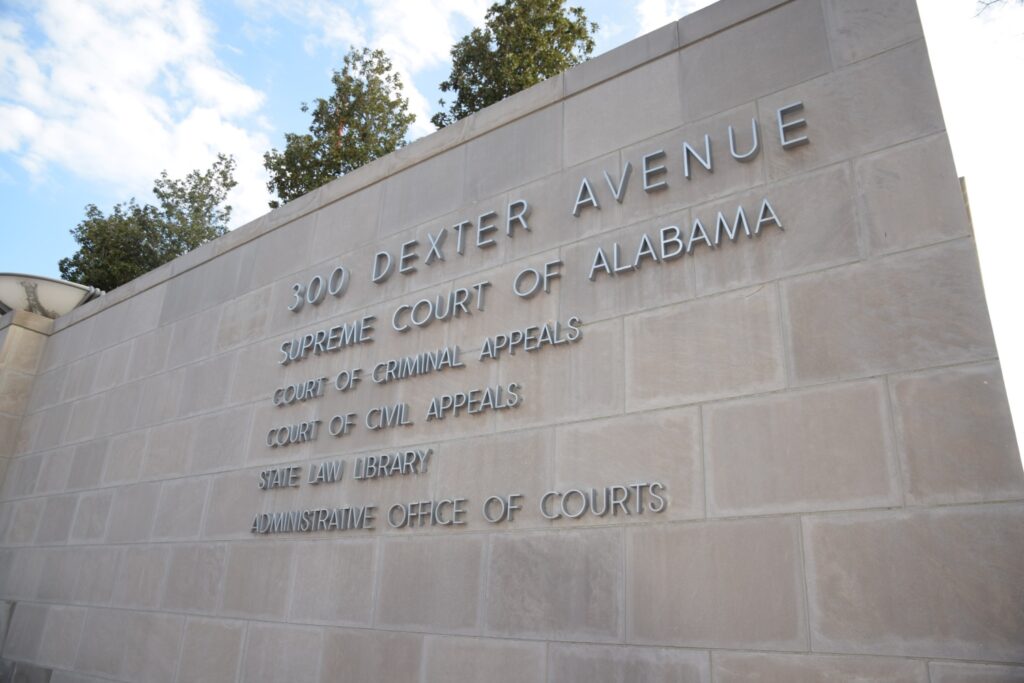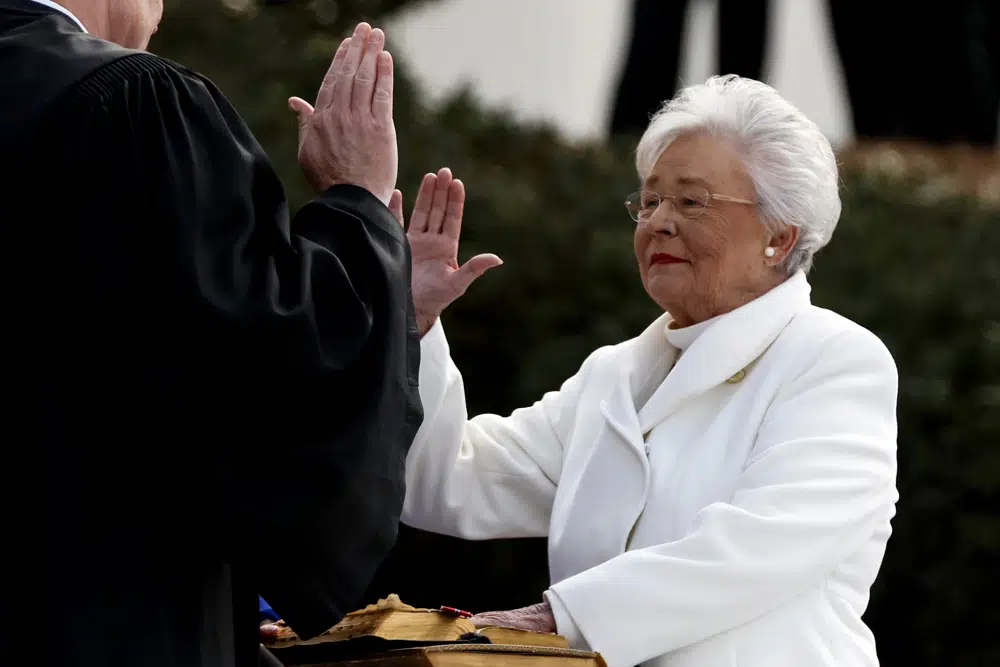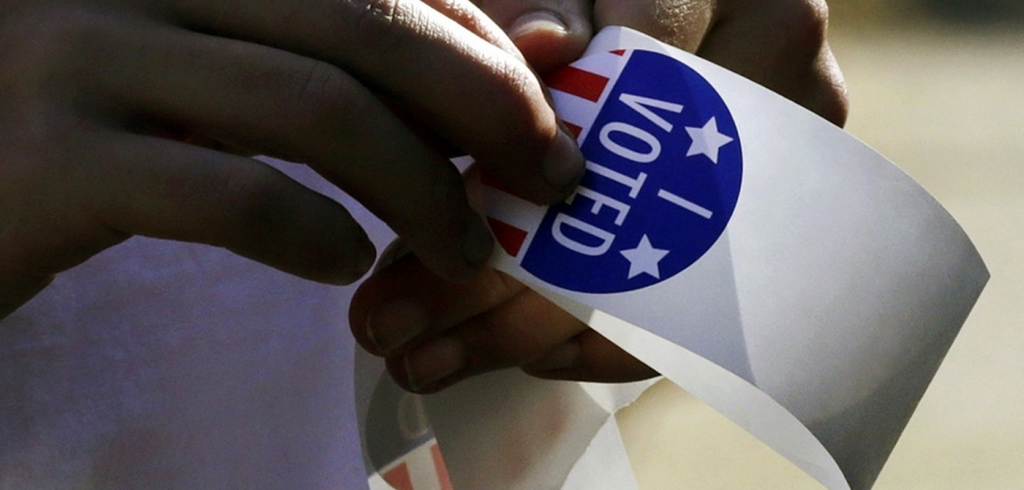Most Republican appellate court incumbents win without an opponent as Democrats concede state appellate courts to the GOP

Major party qualifying ended on Friday. Four Republican Alabama Supreme Court Justices won election when no opponent – Republican or Democrat came forward. Justices Will Sellers, Tommy Bryan, and Jay Mitchell were all effectively re-elected as they face no Republican primary challenger. Write-in candidates are not allowed in party primaries. No attorney qualified for any of these races as a Democrat, so they are unlikely to face an opponent in the November general election. Chris McCool gave up his seat on the Court of Criminal Appeals to run for the open Place 1 associate supreme court justice seat. He also had no Republican or Democratic opponent qualify. On the Alabama Court of Criminal Appeals, Republican incumbent Judges Richard Minor and Bill Cole were both effectively re-elected when no Republican or Democratic opponent qualified for either race. Two Republicans: Rich Anderson and Thomas Govan, qualified for the open Place 2 seat that Chris McCool is leaving to run for Supreme Court. Both Govan and Anderson work in the Alabama Attorney General’s office. No Democrat qualified for that seat either, so Govan and Anderson’s race in the Republican primary on March 5 is likely to decide this race. On the Alabama Court of Civil Appeals incumbents Christy Edwards and Terry Moore were both effectively re-elected when qualifying ended without either facing any opposition. The only incumbent appellate judge in the state to face a challenger is Republican: Republican Chad Hanson at Place 2 on the Court of Civil Appeals is being challenged in the Republican primary by Stephen Davis-Parker. There are four candidates running for Chief Justice of the Alabama Supreme Court. Chief Justice Tom Parker, also a Republican, cannot run again due to the state’s arcane mandatory retirement age for judges provision. Associate Justice Sarah Stewart is giving up her place 1 seat on the court to run for Chief Justice. Former State Senator Bryan Taylor is also running for the office. Taylor is also a former legal counsel for Governors Kay Ivey and Bob Riley. On Friday, Montgomery attorney Jerry Michael Blevins also qualified to run for Chief Justice. Chief Justice is the only state appellate race that the Alabama Democratic Party is even contesting. Judge Greg Griffin will face the eventual Republican nominee for Chief Justice in the November general election. Griffin presently is a Circuit Court Judge in Montgomery’s Fifteenth Judicial Circuit Court. Thirty years ago, Democrats dominated the Alabama appellate courts. That changed in 1994 when retired Judge Perry Hooper Sr. defeated incumbent Sonny Hornsby in a contested race for chief justice. In the years since, Republican fortunes have continued to improve. Only one Democratic candidate, Doug Jones in 2017, has won any statewide race since 2008, and no Democratic judicial candidate has won a statewide race since Sue Bell Cobb was elected Chief Justice in 2006. Democrats are hopeful that Judge Griffin can change their fortunes next year. There is still a slight possibility that an attorney could still qualify as an independent or third-party candidate for one of these offices. To connect with the author of this story or to comment, email brandonmreporter@gmail.com
Steve Flowers: 2024 elections around the corner

Folks, don’t look now, but our 2024 election year is upon us. Next year is a major year in politics nationwide. Not only does the nation elect a president, but most states also elect their governors and legislators for four-year terms in presidential years. We, in Alabama and in most southern states, elect our governors and legislators in nonpresidential years. Those of us who study and talk about Alabama politics refer to these years as gubernatorial years. We elected our governor and legislature last year in 2022. Historically, presidential years have been very dull and unexciting years for Alabama politics. There are very few statewide contests, and those that happen will be decided on March 5. Since we are such an overwhelmingly Republican state, the only way to be elected statewide in the Heart of Dixie is as a Republican. There are 29 statewide elected offices in Alabama, and all 29 are held by a Republican. There are four seats up for election on our Alabama Supreme Court. Justices Jay Mitchell, Tommy Bryan, and Will Sellers are up for reelection to another six-year term on the high tribunal. Justice Sarah Stewart’s seat is up for reelection. However, Sarah has opted to move to the open Chief Justice position, being vacated by the retirement of Chief Justice Tom Parker. Justice Sarah Stewart is a good choice for Chief Justice. She was a Circuit Judge in Mobile County for 14 years before she was elected to the Supreme Court six years ago. The Chief Justice is the administrator of the entire state judicial system. Sarah Stewart’s experience as a circuit judge is invalu,able and she also has the respect and support of most of the circuit judges around the state. Circuit judges are very respected in their counties and communities throughout the state. Sarah Stewart has been campaigning extensively and effectively all over Alabama during 2023. She has let no grass grow under her feet. Speaking of working hard, the judge who will move up to take Sarah Stewart’s seat on the Supreme Court will be Criminal Court of Appeals Judge Chris McCool. Judge McCool is one of the most proven ardent campaigners I have seen in recent years. I said when he announced a year ago that he would not be outworked, and he has proven me right. He has traversed the state from one end to the other, putting over 60,000 miles on his vehicle. Chris McCool will make a great justice and is the perfect representative on the court from the rural area of the state. He hails from rural Pickens County near Gordo and close to the Tuscaloosa County Line. His family has very deep roots in that area. The McCools settled there over 180 years ago, prior to the Civil War. They have farmed the land the entire time. Chris lives in the same place his ancestors lived six generations ago. Chris McCool borders on folk legend for an Alabama judge. He has three full-time professions. He was a lawyer with impeccable credentials. He graduated from the University of Alabama, undergraduate and law school. He practiced law in Gordo before being elected District Attorney of the Pickens, Lamar, and Fayette Circuit at age 30. He served as DA for 18 years and was elected to the Alabama Court of Criminal Appeals six years ago. He is a minister. He pastors the Zion Primitive Baptist Church near his home. His family founded the church, and his great, great, great grandfather was the first pastor. He is also a farmer. Judge McCool’s seat on the Court of Criminal Appeals will be filled by one of two assistant attorney generals. Rich Anderson and Thomas Govan, both of Montgomery, are vying for McCool’s seat on the Court of Criminal Appeals. Both are well-qualified and would do a good job. Justices Chad Hansen and Christy Edwards are up for reelection to the Court of Civil Appeals. They are doing a good job. Justices Bill Cole and Richard Minor are up for reelection on the Court of Criminal Appeals. They both are doing an excellent job. This court has a very heavy caseload. Twinkle Cavanaugh will be elected to her fourth term as President of the Alabama Public Service Commission next year. Twinkle is becoming legendary as a public servant in our state. Although still young, she has built a stellar reputation for honesty, integrity, and conservatism. The former Chairman of the Alabama Republican Party is the best retail politician in Alabama today. She has crisscrossed the state campaigning in 2023 in preparation for 2024. Even though she will more than likely not have an opponent, she is running scared and not taking anything for granted. See you next week. Steve Flowers is Alabama’s leading political columnist. His weekly column appears in over 60 Alabama newspapers. He served 16 years in the state legislature. Steve may be reached at: www.steveflowers.us.
Steve Flowers: Five seats on the Alabama Supreme Court up for election in 2024

Next year is a big year nationally. It is a Presidential year. However, it is a down or off year for Alabama. We, like several other southern states, have our big election year in non-presidential years. We elected our governor, other constitutional offices, and our entire legislature last year in 2022. However, since we have staggered six-year terms for our state judges, we have an inordinate number of seats on our Supreme Court up for election next year. We have nine members of our State Supreme Court. All nine are Republicans. Even though our Supreme Court is elected, we have a surprisingly wise and very qualified state high tribunal. All nine are well-qualified and well-rounded, yet very Republican and very conservative. We are a very Republican and very conservative state. Therefore, these nine judges are reflective of the Heart of Dixie. Even though there are five seats up for election, there is only one opening. Chief Justice Tom Parker is precluded from running for a six-year term. He is 72, and our state laws mandate that someone cannot run for a judgeship after they reach the age of 70. Popular and younger jurists hold the other four seats. Three of the four will seek reelection and will win easily even if they draw opposition. These three incumbents are Will Sellers, Jay Mitchell, and Tommy Bryan. The fourth, Sarah Stewart, is opting to run for the Chief Justice post Tom Parker is vacating. Justice Will Sellers probably will not draw an opponent. He is perfectly suited for the State Supreme Court. His resume reads as though he was born for the job. He was a successful tax attorney in his hometown of Montgomery. He graduated from the University of Alabama Law School and has a Master of Law Degree in Taxation from New York University. His Tax Law expertise is invaluable to his colleagues on the Court. Will has a keen political mind in addition to his legal prowess. He and his wife, Lee Grant Sellers, are Governor Kay Ivey’s closest confidants. Will has sworn Governor Ivey into office at both her Inaugurations. Justice Sellers also pens a monthly column on historical events. Justice Tommy Bryan is up for another six-year term. This popular incumbent jurist will be reelected without opposition. He hails from rural South Alabama – Brantley in Crenshaw County, to be exact. He was first elected in 2012 and reelected to a second six-year term in 2018. Therefore, he will be seeking his third six-year term in 2024. He previously served eight years on the Court of Civil Appeals. He and his lovely wife Pam have two adult children. Tommy and Pam are very active members of the First Baptist Church of Montgomery. Judge Jay Mitchell is the tallest member of the Supreme Court. He stands a good 6 feet 8 inches. He also stands tall with integrity and wit. He is an affable fellow and is finishing his first six-year term on the high court. He will easily win election to his second term, probably unopposed. He graduated from Birmingham Southern College, where he starred in basketball. He graduated from the University of Virginia Law School. He and his wife, Elizabeth, reside in Homewood with their four children. Jay Mitchell is only 46. He is not only the tallest member of the Court but also the youngest. Justice Sarah Stewart is opting to leave her safe seat as an associate justice to seek election as Chief Justice next year. She has already announced and is actively running. More times than not, the early bird gets the worm. Justice Stewart served 13 years as a Mobile Circuit Court Judge prior to going on to the Supreme Court. Judge Chris McCool, an associate justice on the Alabama Court of Criminal Appeals, is favored to win Justice Stewart’s seat. You can bet your bottom dollar he will not be outworked. Even though there are five seats up for reelection on the high court, there will be very little change when the dust settles. This is a good court, and they have an excellent collegial working relationship. The 2024 elections have begun. See you next week. Steve Flowers is Alabama’s leading political columnist. His weekly column appears in over 60 Alabama newspapers. He served 16 years in the state legislature. Steve may be reached at: www.steveflowers.us.
Alabama extends time for executions, ends automatic review

Alabama has changed death penalty procedures to give the prison system more time to carry out executions — a move that comes after a string of troubled lethal injections in the state — and also eliminated an automatic review for trial errors in death penalty cases. Alabama Gov. Kay Ivey’s office called the time window change a “win for justice,” and supporters said the appeal change would ease the burden on the court system. But a noted death penalty lawyer said the changes end a crucial avenue of review and increase the likelihood of “more cruelty and potential torture.” The Alabama Supreme Court announced the changes to appellate procedure last Friday. At Ivey’s request, the court abolished the previous one-day time frame to carry out a death sentence. Instead, the governor will set a window of time for the execution. A divided court in a 6-3 decision also eliminated an automatic “plain error review” where the Alabama Court of Criminal Appeals automatically reviews death penalty cases for a clear error at trial even though the defense lawyer did not object. Justices said judges on the appeals court may undertake the review but are no longer required to do so. “I think the combination of these two rules increases the likelihood that we’re going to see more wrongful convictions, more unjust sentences, and more cruelty and potential torture,” said Bryan Stevenson, founder of the non-profit Equal Justice Initiative. Stevenson said that nearly 40% of the reversals in Alabama death penalty cases have come under the plain error review. He said the rule has been in place since the death penalty was reinstated in Alabama in 1976, and its repeal is “shocking.” Justice Jay Mitchell wrote in a concurring opinion that the change will relieve the court’s burden, so they are no longer required to “scour the record in search of such errors, nor will it be compelled to analyze claims of error.” He said lawyers for death row inmates can present the issues in other appeals. “Plain-error review requires already overloaded appellate courts to spend hundreds, if not thousands, of hours per case scrutinizing trial-court records for possible errors and then explaining why those errors are (or are not) reversible,” Mitchell wrote. However, two justices who are former members of the Court of Criminal Appeals dissented in the decision. Justice Kelli Wise wrote that she could not support a complete repeal despite the time required. “In these cases, the defendants’ very lives are at stake, and I believe that such cases are entitled to heightened review on direct appeal,” Wise wrote. The court also granted Ivey’s request to expand the amount of time that Alabama has to carry out an execution. Ivey asked for the change after announcing a “top-to-bottom” review of execution procedures. The review came after an unprecedented third failed lethal injection in the state following problems with intravenous lines and late-running appeals. Death warrants issued by the Supreme Court had been limited to a single day, resulting in a midnight deadline to get the execution underway. Now, after the court issues a death warrant, the governor will set a time window to carry out the execution. Justices left it up to the governor to decide how long that time window will be. “I view this as a win for justice. As we initially interpret the order, it secures an extended time frame, which was a primary request of the governor’s,” Ivey spokeswoman Gina Maiola said in an email. She said the governor’s staff will review the order with the prison system. Stevenson says while other states give longer than a day, no state allows a governor that kind of power. He said it would allow already problematic executions to go on for longer. The state in November called off the execution of Kenneth Eugene Smith, which was the state’s second such instance of being unable to put an inmate to death in the preceding two months and its third since 2018. The state completed an execution in July, but only after a three-hour delay caused at least partly by the same problem with starting an IV line. Republished with the permission of The Associated Press.
Steve Flowers: Who are the nine people who sit on our state Supreme Court?

This week allow me to share with you a sketch of the men and women who sit on our State Supreme Court. These nine Justices are all Republican, all conservative on both social and business issues. All are very devout in their faith and very connected to their church and their family. Chief Justice Tom Parker has been on the State Supreme Court since 2005. He was born and raised in Montgomery and went to Dartmouth College and Vanderbilt Law School. Chief Justice Parker and his wife the former Dottie James of Auburn have been married 39 years. Dottie was a supervisor of the governor’s mansion during the Fob James administration. They are Methodist. Justice Jay Mitchell is the most personable and definitely the tallest member of the Supreme Court. Jay was a star basketball player at Birmingham Southern where he graduated Phi Beta Kappa. He is imminently qualified for the Supreme Court having graduated from the University of Virginia Law School and had a sterling career with a Birmingham Law firm prior to being overwhelmingly elected to the high tribunal in 2018. Justice Mitchell and his wife, Elizabeth Mitchell, have four children. They reside in Homewood and are members of the Church of the Highlands. Justice Tommy Bryan is a popular and conservative member of the high court. Tommy was born on a family farm in Crenshaw County. He served on the Court of Civil Appeals and was an assistant attorney general prior to being elected to the Supreme Court in 2012. Justice Bryan and his wife, Pamela Bryan, are very active members of the First Baptist Church of Montgomery where he is a Deacon, Sunday School teacher, and sings in the choir. He and Pam are very close and have raised two fine children. Justice William “Will” Sellers, like Justice Parker, is a Montgomery native, as is Will’s outstanding wife, Lee Grant Sellers. Justice Sellers and Lee have been married 33 years and have three adult children and are active members of Trinity Presbyterian Church of Montgomery. Will was a prominent Tax Attorney prior to going on the court. He is a graduate of the University of Alabama Law School and has a New York University tax degree. Justice Brad Mendheim was a Circuit Judge in Houston County prior to going on the Supreme Court. He was born and raised in Dothan and is one of the most respected young men to have come out of his hometown. He is a graduate of Auburn University and Cumberland School of Law. He and his wife of 24 years, Michelle Mendheim, are very active members of the First Baptist Church of Dothan and they have three fine sons. Justice Greg Shaw epitomizes a judge both professionally and personally. He is said to be the hardest working member of the Court and takes his role seriously and is well above reproach. He has an outstanding wife, Samantha “Sam” Shaw, who has also had a sterling career in politics. She was overwhelmingly elected State Auditor twice, serving eight years. Greg and Sam live on a farm about an hour from Montgomery. They have two outstanding sons and are members of the Auburn United Methodist Church. Justice Shaw graduated from Auburn and Samford’s Cumberland School of Law. Justice Sarah Stewart is a longtime Mobilian and was a Mobile Circuit Judge prior to going on the Court. She is a very respected jurist and a graduate of Vanderbilt Law School. She and her husband, Craig Stewart, have two children and are Methodists. Justice Mike Bolin is one of the finest men I have ever known. Mike was a stellar and popular Probate Judge in Jefferson County prior to his service on the Supreme Court. He is a graduate of Samford University and a graduate of Cumberland School of Law. Justice Bolin and his wife, Rosemary Bolin, have one daughter. They attend St. Peter the Apostle Church in Hoover. Unfortunately, Judge Bolin cannot run for reelection next year. He will be over 70 and is term limited under state law. However, last but not least, Justice Kelli Wise is well below 70 and can and will run for reelection next year and she will win. She is a very popular member of the high court. Kelli served several terms on the Court of Criminal Appeals before matriculating to the Supreme Court. Justice Wise and her husband, former District Court Judge Arthur Ray, have one daughter and are members of the St. James United Methodist Church. Kelli is a Wiregrass native up for reelection next year in 2022. See you next week. Steve Flowers is Alabama’s leading political columnist. His weekly column appears in over 60 Alabama newspapers. He served 16 years in the state legislature. Steve may be reached at www.steveflowers.us.
More Democrats on Alabama ballot for Tuesday elections than in previous years

Alabama’s primary ballot features multiple offices and something voters in the Republican-controlled state haven’t seen in years: Democratic races for statewide and congressional positions. Alabama Democrats have 27 total candidates running for state positions or Congress this year, more than double the 13 from 2014. That means there are several Democratic primary races, compared to just one for a statewide office four years ago. Many of the eventual Republican nominees will still run unopposed in the General Election because no Democrats qualified. But with Democratic opposition to President Donald Trump running high and after Democrat Doug Jones’ victory in Alabama’s U.S. Senate in December, the once-powerful party is trying to show signs of life. Aside from the governor’s campaign, in which five Republicans and six Democrats are vying for their party’s nominations, here are some other races to watch: ___ Attorney General Republican appointee Steve Marshall is facing voters for the first time in a statewide race as he seeks election to the office of attorney general, and it might not be easy. Marshall, a former Marshall County district attorney, has served in the job since February 2017, when then-Gov. Robert Bentley tapped him after naming Luther Strange to the U.S. Senate. Marshall is being opposed in the GOP primary by Alice Martin, a former federal prosecutor who was the state’s chief deputy attorney general; Troy King, a former state attorney general and Birmingham lawyer Chess Bedsole. Birmingham attorneys Joseph Siegelman and Chris Christie are vying for the Democratic nomination. Siegelman is the son of former Gov. Don Siegelman. The attorney general is responsible for representing the state in criminal and civil matters, and the office often is a stepping-stone to other positions. Just ask U.S. Attorney General Jeff Sessions, a former Alabama attorney general. ___ Congress Rep. Martha Roby’s bid to hold on to her District 2 seat from the Wiregrass region of southeastern Alabama for a fifth term highlights the state’s congressional primaries. The House Appropriations Committee member is being opposed by candidates including Bobby Bright, who Roby defeated to claim the seat in 2010. Other opponents include Rich Hobson of Enterprise, who managed Roy Moore’s unsuccessful Senate campaign last year. Roby gained Republican critics after distancing herself from Donald Trump’s vulgar comments about women during his presidential campaign in 2016. The eventual GOP nominee will face either education researcher Tabitha Isner of Montgomery or activist and military veteran Audri Scott Williams of Cottonwood. They’re competing for the Democratic nomination in the Republican-dominated district. Reps. Mo Brooks of Huntsville and Robert Aderholt of Haleyville also have challengers in the GOP primary, and Democrats have primaries in four districts in all. There was just one Democratic congressional primary in 2014. ___ Lieutenant Governor Alabama has been without a lieutenant governor for more than a year, and the primary is a first step toward filling the office. Alabama Public Service Commission president Twinkle Andress Cavanaugh is running in the Republican primary against two state legislators: Rep. Will Ainsworth of Guntersville and Sen. Rusty Glover of Mobile. Cavanaugh has outpaced other candidates in fundraising with nearly $1.1 million in total contributions through April. The eventual Republican nominee will face Democratic minister Will Boyd, who lost the U.S. Senate primary against Doug Jones in the special election last year. The office of lieutenant governor, who is president in the state Senate, has been vacant since April 2017, when Kay Ivey succeeded Robert Bentley as governor following his resignation and guilty plea amid a sex-tinged scandal. Ethics is a top issue in the race as the Legislature looks to review Alabama’s ethics law next year and lawmakers currently face corruption charges. ___ Supreme Court The Alabama Supreme Court isn’t in the news as often as it used to be without Roy Moore as chief justice, but the primary ballot includes three contested races on the nine-member, all-Republican panel. Current court members Lyn Stuart and Tom Parker are vying for the Republican nomination for chief justice. Stuart has been serving in the position since Moore’s suspension for violating judicial ethics and later resignation to run for the Senate. Either Stuart or Parker will face Bob Vance Jr., a Jefferson County circuit judge who is unopposed for the Democratic nomination. Court appointee Brad Mendheim is opposed by circuit judges Debra Jones of Anniston and Sarah Hicks Stewart of Mobile for the GOP nomination for Place 1 on the nine-member court. And attorneys John Bahakel and Jay Mitchell of Birmingham are both seeking the Republican nomination for the Place 4 seat. The winner will face Democrat Donna Wesson Smalley in November. ___ State School Board Republicans are fighting over two seats on the Alabama State Board of Education, and the winners of both races will have Democratic opponents in the fall. Four Republicans are running for the District 2 seat held by Betty Peters, who isn’t seeking re-election. They include former Dothan school board member Melanie Hill; Coffee County resident Sybil Little; John Taylor of Dothan; and Auburn City School Board President Tracie West. The winner will face Democrat Adam Jortner in November. Business executive and former Madison school board Rich McAdams and Wayne Reynolds, a retired educator and registered nurse from Athens, are seeking the Republican nomination in District 8. The seat is now held by Mary Scott Hunter, who is running for the Alabama Senate. Jessica Fortune Barker is on the ballot as a Democrat in the General Election. Republished with the permission of the Associated Press.
Who’s who in statewide and congressional races on the primary ballot

Alabama’s primary ballot features multiple offices and something voters in the Republican-controlled state haven’t seen in years: Democratic races for statewide and congressional positions. Alabama Democrats have 27 total candidates running for state positions or Congress this year, more than double the 13 from 2014. That means there are several Democratic primary races, compared to just one for a statewide office four years ago. Many of the eventual Republican nominees will still run unopposed in the General Election because no Democrats qualified. But with Democratic opposition to President Donald Trump running high and after Democrat Doug Jones’ victory in Alabama’s U.S. Senate in December, the once-powerful party is trying to show signs of life. Aside from the governor’s campaign, in which five Republicans and six Democrats are vying for their party’s nominations, here are some other races to watch: ___ Attorney General Republican appointee Steve Marshall is facing voters for the first time in a statewide race as he seeks election to the office of attorney general, and it might not be easy. Marshall, a former Marshall County district attorney, has served in the job since February 2017, when then-Gov. Robert Bentley tapped him after naming Luther Strange to the U.S. Senate. Marshall is being opposed in the GOP primary by Alice Martin, a former federal prosecutor who was the state’s chief deputy attorney general; Troy King, a former state attorney general and Birmingham lawyer Chess Bedsole. Birmingham attorneys Joseph Siegelman and Chris Christie are vying for the Democratic nomination. Siegelman is the son of former Gov. Don Siegelman. The attorney general is responsible for representing the state in criminal and civil matters, and the office often is a stepping-stone to other positions. Just ask U.S. Attorney General Jeff Sessions, a former Alabama attorney general. ___ Congress Rep. Martha Roby’s bid to hold on to her District 2 seat from the Wiregrass region of southeastern Alabama for a fifth term highlights the state’s congressional primaries. The House Appropriations Committee member is being opposed by candidates including Bobby Bright, who Roby defeated to claim the seat in 2010. Other opponents include Rich Hobson of Enterprise, who managed Roy Moore’s unsuccessful Senate campaign last year. Roby gained Republican critics after distancing herself from Presidential Donald Trump’s vulgar comments about women in 2016. The eventual GOP nominee will face either education researcher Tabitha Isner of Montgomery or activist and military veteran Audri Scott Williams of Cottonwood. They’re competing for the Democratic nomination in the Republican-dominated district. Reps. Mo Brooks of Huntsville and Robert Aderholt of Haleyville also have challengers in the GOP primary, and Democrats have primaries in four districts in all. There was just one Democratic congressional primary in 2014. ___ Lieutenant Governor Alabama has been without a lieutenant governor for more than a year, and the primary is a first step toward filling the office. Alabama Public Service Commission president Twinkle Andress Cavanaugh is running in the Republican primary against two state legislators: Rep. Will Ainsworth of Guntersville and Sen. Rusty Glover of Mobile. Cavanaugh has outpaced other candidates in fundraising with nearly $1.1 million in total contributions through April. The eventual Republican nominee will face Democratic minister Will Boyd, who lost the U.S. Senate primary against Doug Jones in the special election last year. The office of lieutenant governor, who is president in the state Senate, has been vacant since April 2017, when Kay Ivey succeeded Robert Bentley as governor following his resignation and guilty plea amid a sex-tinged scandal. Ethics is a top issue in the race as the Legislature looks to review Alabama’s ethics law next year and lawmakers currently face corruption charges. ___ Supreme Court The Alabama Supreme Court isn’t in the news as often as it used to be without Roy Moore as chief justice, but the primary ballot includes three contested races on the nine-member, all-Republican panel. Current court members Lyn Stuart and Tom Parker are vying for the Republican nomination for chief justice. Stuart has been serving in the position since Moore’s suspension for violating judicial ethics and later resignation to run for the Senate. Either Stuart or Parker will face Bob Vance Jr., a Jefferson County circuit judge who is unopposed for the Democratic nomination. Court appointee Brad Mendheim is opposed by circuit judges Debra Jones of Anniston and Sarah Hicks Stewart of Mobile for the GOP nomination for Place 1 on the nine-member court. And attorneys John Bahakel and Jay Mitchell of Birmingham are both seeking the Republican nomination for the Place 4 seat. The winner will face Democrat Donna Wesson Smalley in November. ___ State School Board Republicans are fighting over two seats on the Alabama State Board of Education, and the winners of both races will have Democratic opponents in the fall. Four Republicans are running for the District 2 seat held by Betty Peters, who isn’t seeking re-election. They include former Dothan school board member Melanie Hill; Coffee County resident Sybil Little; John Taylor of Dothan; and Auburn City School Board President Tracie West. The winner will face Democrat Adam Jortner in November. Business executive and former Madison school board Rich McAdams and Wayne Reynolds, a retired educator and registered nurse from Athens, are seeking the Republican nomination in District 8. The seat is now held by Mary Scott Hunter, who is running for the Alabama Senate. Jessica Fortune Barker is on the ballot as a Democrat in the General Election. Republished with the permission of the Associated Press.
Here’s everyone who the BCA has endorsed in the 2018 election cycle

The Business Council of Alabama (BCA), considers itself Alabama’s foremost voice for business. It is a non-partisan, statewide, business association representing the interests and concerns of nearly 1 million working Alabamians. The BCA works with the Alabama Legislature to promote “pro-business” reforms such as: Tax credits for small business Job creation Incentives for economic development Ethics reform Positive changes in our public education system Here are the candidates who the BCA has endorsed, who they believe will bring the best changes and initiatives for Alabama’s businesses: Statewide Races: Governor: Kay Ivey Lieutenant Governor: Twinkle Cavanaugh Attorney General: Steve Marshall Secretary of State: John Merrill State Treasurer: John McMillan Commissioner of Agriculture and Industries: Rick Pate Judicial Races: Chief Justice: Lyn Stuart Associate Justice Place 1: Sarah Stewart and Brad Mendheim Associate Justice Place 2: Tommy Bryan Associate Justice Place 3: Will Sellers Associate Justice Place 4: Jay Mitchell Court Of Civil Appeals Place 1: Christy Edwards Court Of Civil Appeals Place 2: Judge Terri Thomas Court Of Civil Appeals Place 3: Judge Terry Moore Court Of Criminal Appeals Place 1: Richard Minor Court Of Criminal Appeals Place 2: Chris McCool Court Of Criminal Appeals Place 3: Judge Bill Cole State Senate Races Senate District 2: Tom Butler Senate District 3: Arthur Orr Senate District 5: Greg Reed Senate District 7: Mary Scott Hunter Senate District 12: Del Marsh Senate District 13: Randy Price Senate District 14: Cam Ward Senate District 16: Jabo Waggoner Senate District 17: Shay Shelnutt Senate District 18: Rodger Smitherman Senate District 32: Chirs Elliott State House Races House District 3: Humphrey Lee House District 6: Andy Whitt House District 8: Terri Collins House District 9: Scott Stadthagen House District 13: Connie Rowe House District 14: Richard “Bull” Corry House District 27: Wes Kitchens House District 30: Craig Lipscomb House District 36: Randy Wood House District 39: TJ Maloney House District 40: K.L. Brown House District 41: Corley Ellis House District 42: Jimmy Martin House District 43: Arnold Mooney House District 44: Danny Garrett House District 45: Dickie Drake House District 46: David Faulkner House District 47: David Wheeler House District 48: Jim Carns House District 49: April Weaver House District 50: Jim Hill House District 55: Rod Scott House District 73: Matt Fridy House District 87: Jeff Sorrells House District 88: Jeremy Arthur House District 89: Marcus Paramore House District 96: Matt Simpson House District 102: Willie Gray
Steve Flowers: Supreme Court races on ballot this year

Among the plethora of races on the ballot this year are the important seats on the Alabama Supreme Court. We have an unprecedented five out of nine seats up for election. Our Alabama Supreme Court as well as our Courts of Criminal Appeals are extremely conservative, pro-business and all Republican. This conservatism dates back to the 1980’s and 1990’s. During that two-decade run, the plaintiff lawyers controlled and dominated our State Supreme Court. We were known throughout the country as a Plaintiff’s paradise. It was like a fairytale jackpot justice system. It was not uncommon for ludicrous multimillion dollar verdicts to be upheld daily for all types of cases. We were called Tort Hell by “Time Magazine.” Tort reform became the dominant issue in the Halls of the Legislature. When you have unbridled monetary verdicts coming out of Alabama that gives a plaintiff millions of dollars for having a wreck in a General Motors vehicle, it affects the entire country. General Motors does business in all 50 states. Well the business community throughout the country and in Alabama decided enough was enough. They decided to close down tort hell. They put their money where their mouth was and replaced an all Democratic plaintiff trial lawyer Supreme Court with an all Republican pro-business court. The pendulum has swung completely from left to right. If yesterday’s court was extremely liberal, today’s Alabama Supreme Court is extremely conservative. These five open seats will be held by conservative Republicans when the dust settles at the end of the year and they begin their six-year terms. It is just a matter of which Republican presides and decides the major cases that affect Alabamians. Will Sellers, a very well respected Montgomery attorney, was appointed by Governor Kay Ivey last year to Place 3 on the high court. Justice Sellers is running without opposition and will have a full six-year term. Popular Justice, Tommy Bryan, also has no opposition and will return for another six-years on the high tribunal. Justice Jim Main who has had a distinguished career as a private lawyer, finance director and Supreme Court Justice, cannot run for reelection due to an antiquated law that disallows judges to run for reelection after they turn 70. Main’s Place 2 is being sought by Jefferson County’s John Bahakel and Jay Mitchell, also of Birmingham. Circuit Judge, Debra Jones of Calhoun County has been a judge for a decade and has run a get acquainted race for the court. She will be formidable. This place was held by Justice Glen Murdock who is originally from the Wiregrass. Murdock retired a few months ago and Governor Kay Ivey did a good day’s work when she appointed another Wiregrass native, Brad Mendheim to replace him. Mendheim has served a decade as a Circuit Judge in Dothan. He is very well respected in his hometown. He is seeking a full term. Sarah Stewart of Mobile is also in the race and should benefit from being from the vote rich Mobile-Baldwin area. The battle royale will be for the Chief Justice post. The Chief Justice not only presides over the nine member Supreme Court but also oversees the entire Court System. Justice Lyn Stuart currently presides as Chief Justice. She is running for a full 6-year reign. When the business community orchestrated the takeover of the Court, they brought in the vaunted Karl Rove to mastermind the plan. When he departed, victoriously, he left with this admonition, “The best candidate that you can put forward is a female Republican who has some experience as a Circuit Judge.” Alabamians prefer females on the Bench. If you have a race for Judge in Alabama and you have two names on the ballot, one Sue Smith and one Sam Smith and neither spends any money on campaigns and neither is known, Sue Smith will win. Lyn Stuart epitomizes this scenario perfectly. She became a respected Circuit Judge in Baldwin County at a very young age. She was elected to the Supreme Court over a decade ago and is the longest serving member of the Court. She will be pitted against another sitting member of the Court, Justice Tom Parker. He has excellent polling numbers. He was Roy Moore’s closest ally on the Court. Stuart is the sweetheart of the Business Council. Parker is the darling of the social conservatives. The race for Chief Justice will be one of the premier contests this year. See you next week. ••• Steve Flowers is Alabama’s leading political columnist. His weekly column appears in over 60 Alabama newspapers. He served 16 years in the state legislature. She may be reached at www.steveflowers.us.
Birmingham attorney Jay Mitchell enters Alabama Supreme Court race

Birmingham attorney Jay Mitchell entered the race for Alabama Supreme Court on Monday, seeking the Republican nomination for the Place 4 seat currently held by Associate Justice Jim Main. “The people of Alabama deserve to have justices on the Supreme Court who know the law, will faithfully apply the law as written, and will uphold the Constitution and the principles on which our nation was founded,” Mitchell said in a press release. Mitchell continued, “I have a strong commitment to the rule of law. The people of Alabama deserve to have Justices on the Supreme Court who know the law, will faithfully apply the law as written, and will uphold the Constitution and the principles on which our nation was founded. That is the kind of Justice I will be. If elected, I will serve the people of Alabama with integrity, passion, and fidelity to the law.” An accomplished litigator with the Birmingham firm, Maynard, Cooper & Gale, Mitchell is a graduate of Homewood High School He holds an M.A. from University College Dublin (Ireland) and a B.A. magna cum laude from Birmingham-Southern College, where he graduated Phi Beta Kappa, served as President of the student body, and played forward on the school’s 1995 national championship basketball team. He received his J.D. from the University of Virginia School of Law. According to his bio, he has a long history of involvement with the Republican Party and the conservative movement in Alabama. He is a member of the Federalist Society. Mitchell and his wife, Elizabeth, are longtime members of Church of the Highlands. They reside in Homewood with their four children.


